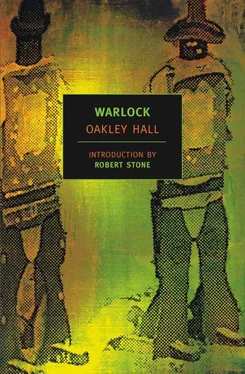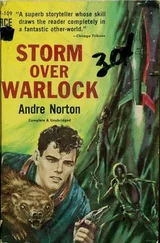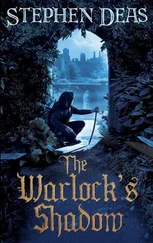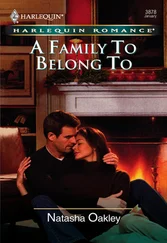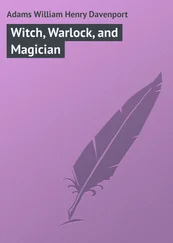“Damn you, Marshal!” Slator cried. “This is none of your—”
“Come here!” Blaisedell said. When Slator didn’t move he fired into the planks at his feet. Slator jumped and yelled. “Come here!” Slator moved forward, trying to cover his head with his hands. Blaisedell slashed the gun barrel down and he staggered back. Hands caught him and he disappeared into the crowd.
“Take that one off, too,” Blaisedell said, and the same men hurriedly dragged Vint off the boardwalk.
“You have done McQuown’s work tonight, Blaisedell!” a man yelled.
“If you have got something to say, step up here and say it,” Blaisedell said, not loudly. “Otherwise skedaddle.” No one spoke. There was a movement away down Main Street. “Then all of you skedaddle,” Blaisedell said, raising his voice. “And while you are doing it think how being in a lynch mob is as low a thing as a man can be.”
There was bitter muttering in the street, but the mob began to disperse. Blaisedell holstered his Colt. Gannon could see his face in profile, stern and contemptuous, and thought how they must hate him for this. But he had saved shooting; he had probably saved lives.
Carl was mopping his face with his bandanna. “Well, thank you kindly, Marshal,” he said. “I expect there isn’t a one in there worth any man’s trouble. But damned if you don’t hate to be run by a bunch of whisky-primed, braying fools like that.”
Blaisedell nodded. Pike Skinner, Gannon saw, was looking at the marshal with a reluctant awe on his face.
“Prisoners get a scare?” Blaisedell asked.
“Caterwauling like a bunch of tomcats in there,” Carl said, and chuckled breathlessly.
Blaisedell nodded again. Suddenly he said, with anger in his voice, “A person surely dislikes a mob like that. They are men pretending they are brave and hard, but every one so scared of the man beside him he can’t do anything but the same.” He glanced from Pike to Gannon. “Well, I didn’t go to butt in so,” he said, as though apologizing. “I expect you boys could’ve handled it. It is just I surely dislike a mob of men like that.”
“I guess we couldn’t’ve handled it, Marshal,” Pike said. “Things had got tight.”
Gannon said, “I guess we would’ve had to go to shooting,” and Blaisedell smiled with a brief, white show of teeth below his mustache. He made a curt gesture of salute, as though acknowledging that as the proper compliment.
The four of them stood in awkward silence, watching the men drifting away before them in the darkness. Then Carl turned and went inside, and Pike followed him. When the others had gone, Blaisedell said to Gannon, “Your brother was with them, I heard.”
“Yes,” he said.
“Too bad,” Blaisedell said. “Young fellow like that.” Blaisedell stood with him a moment longer, as though waiting for him to speak, but he could think of nothing to say and after a time the marshal said, “Well, I’ll be going.” With long strides he faded off into the darkness.
Gannon slowly turned back inside the jail. His clothes were soaked with sweat. Billy stood alone at the cell door. “Well,” Carl was saying to Pike, leaning against a corner of the table with his arms folded over his chest, “good lesson on how to run off a mob. Haul them out and knock their heads loose one at a time.”
“More lesson than that,” Pike said ruefully. “For it takes a man to do it.” He nodded toward the door.
Gannon looked down at the blanket-wrapped body that was Phlater, whom Billy had shot. So the cards he had missed had not mattered. The lynch mob was gone. He knew that Billy had not been at the stage, but with Phlater dead and Billy’s stubborn pride, that would not matter either. So the rest of the cards would continue to play themselves out.
Pony said savagely, “Shut up about that gold-hanneled son of a bitch and leave us get some sleep in here.”
Carl’s face stiffened. Pike said hoarsely, “Gold-handled son of a bitch that just saved your rotten lives for you!”
“Sleep good on that,” Carl said.
Billy’s voice was bitter as gall. “Bring his boots and we’ll kiss them for him. Like he wants. Like you all do. Bring us his damned boots.”
Pike took a step toward the cell door and Billy retreated. Now none of them were visible in the deep shadow of the cell, but it was as though Gannon could see through it, and beyond it, and beyond Bright’s City even, see all the massive irrevocable shadows with only the details not clear.
He went out to the Boston Café, after a while, for a pot of coffee to take back to the jail, and sat the night, sleepless himself, watching Carl and Pike fighting sleep. In the morning Buck Slavin furnished a special coach, and Carl, Peter Bacon, Chick Hasty, and Tim French took the prisoners into Bright’s City for trial.
WARLOCK’S Boot Hill was not a hill at all, but a knoll protruding from the plateau next to the town dump, where flies hovered in great black swarms. From Boot Hill itself the valley all the way to the Dinosaurs was visible: near at hand the jumble of great rocks of the malpais, farther down the cottonwoods lining the river in irregular stretches, the greasy-green mesquite thickets, and the drier green of the grama grass along the bottoms. To the south were the barren, tan sides of the Bucksaws, marked here and there with winding mine roads, the neat ugly smears of tailings below the gallows of the shafthead frames. Farther to the west were the chimneys of the stamp mill at Redgold, with the smoke blowing southwest in gray chunks.
Today there were two open graves, two pine coffins resting on the stony ground beside them. It was windy among the mounded graves. Men stood hatless and their hair blew askew and their trouser bottoms flapped — groups of townsmen, a few cowboys, two women in deep bonnets, and a number of curious Mexicans standing close by. A little apart stood Miss Jessie Marlow, with her hand on Marshal Clay Blaisedell’s arm, and, on the other side of her, Dr. Wagner in his old black suit. Further along, all in black and standing alone, was the new woman, who, it was rumored, had paid for the coffins. Beyond her were six women from the Row, bunched close together as though for protection, from time to time one painted, powdered face or another glancing curiously sideways at the strange woman. Morgan was also alone, his hat in his hands like the rest of the men, his sleek hair shining in the sun and undisturbed by the wind, standing with one foot up on a rock and brooding down at the first coffin.
The four gravediggers, who had been assigned a month’s duty as such by Judge Holloway in penance for being drunk and disorderly on various occasions, leaned on their shovels while Bill Wolters, one of Taliaferro’s barkeepers, recited the service from memory in a loud, sing-song, former-Baptist-preacher’s voice, that was broken into snatches of sound by the wind. The coffin was let down into the first grave with new yellow ropes, and Wolters moved to the second grave and recited again. The second coffin was lowered, and the gravediggers began shoveling dirt and rocks into the holes. The Mexicans, the strange woman, and one of the women from the Row crossed themselves. Morgan brought a cheroot from his pocket and chewed on it. Some of the other men took turns with the shovels. Dick Maples produced the two crosses he had fashioned and painted — it was his hobby. On the first was:
PATRICK CLETUS
Murdered by Bandits
January 23, 1881
“How long, oh Lord?”
On the second:
THEODORE PHLATER
Shot by Billy Gannon
January 23, 1881
“A time of war—”
A group of Citizens’ Committee members began moving away from the graves together. “Who is the tall woman?” asked Joseph Kennon.
Читать дальше
